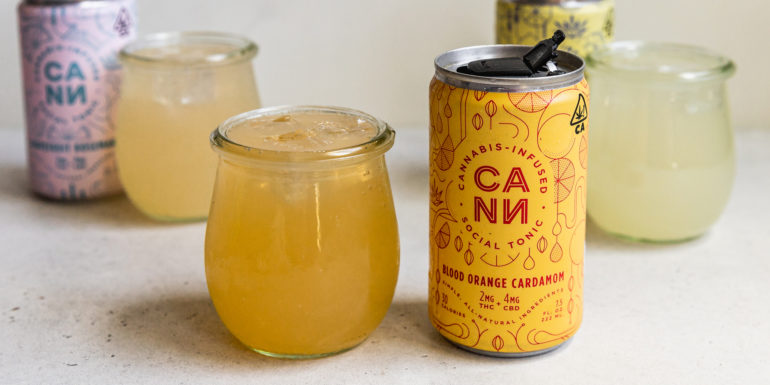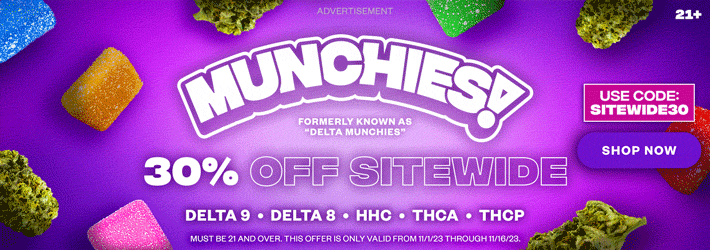Cannabis-infused drinks aren’t exactly a new idea – people have been toying with the concept for many years now – but previous attempts have all ran into road-blocks. Whether it’s a gross kind of off-milk texture or inconsistent dosages, it’s a complicated concept to make work because THC and CBD are not water-soluble.
But over the past few years, new technologies and approaches to the problem have actually made it scalable and effective, and with celebrity endorsements for products like CANN, the THC drinks trend appears to be on the rise. But is it worth trying out? Does it really work? Could it actually replace alcohol as the go-to social drink?
TL;DR
- Cannabis-infused drinks offer a socially-acceptable alternative to vaping or smoking, and much lower doses than most edibles (often microdoses).
- Microdoses of cannabis (generally considered to be anything less than 10 mg) offer some of the benefits of weed while not getting you too high, which makes it a great option for casual or medicinal users.
- Cannabis-infused beverages are both healthier and more socially responsible than alcohol.
- You can find cannabis-infused beers, wines, cocktails, tonics, cocktails, sodas and even teas or coffees.
- The alcohol industry has started to invest in the cannabis beverage space, and will likely do so more if the market continues to grow.
Why infused drinks? Why not just use edibles or flower?
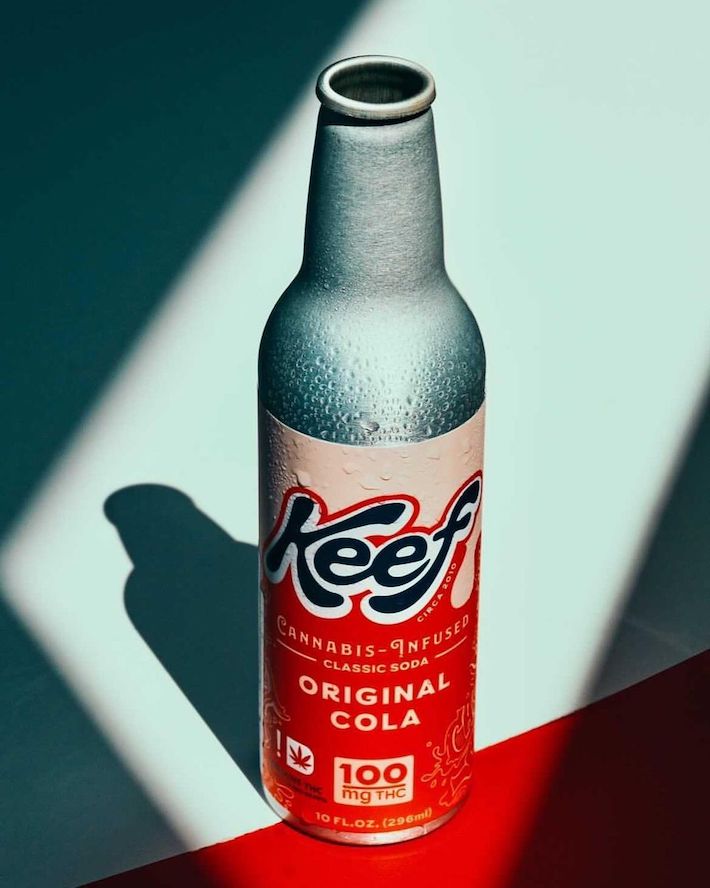
The first question you’re likely to have when you encounter the idea of cannabis-infused drinks is a simple one: why? The answer really depends on your attitudes, because most basically the answer could just be, why not? But there are several deeper answers, of course.
Firstly, it’s similar enough to edibles to meet the needs of those who don’t want to smoke or vape, but the doses take effect much more quickly (from 5 to 30 minutes after drinking, vs. often an hour or more for edibles), which makes it easier to get your dosage right and also allows for a shorter, session-like experience.
Secondly, the dosages with weed drinks are generally much lower than they would be with edibles or even smoking or vaping flower. This might be a downside if you’re looking to get super high, but in a social setting – especially if not everyone is indulging – less is often the best approach. The aim is to let you enjoy the feeling of being high in a lighter, more short-lived way, and give you a pretty efficient and fast-acting way to control your dosage. Plus it’s enjoyable in a bar environment, which while possible with edibles doesn’t really work when it comes to smoking or vaping.
What’s the benefit of microdosing cannabis?
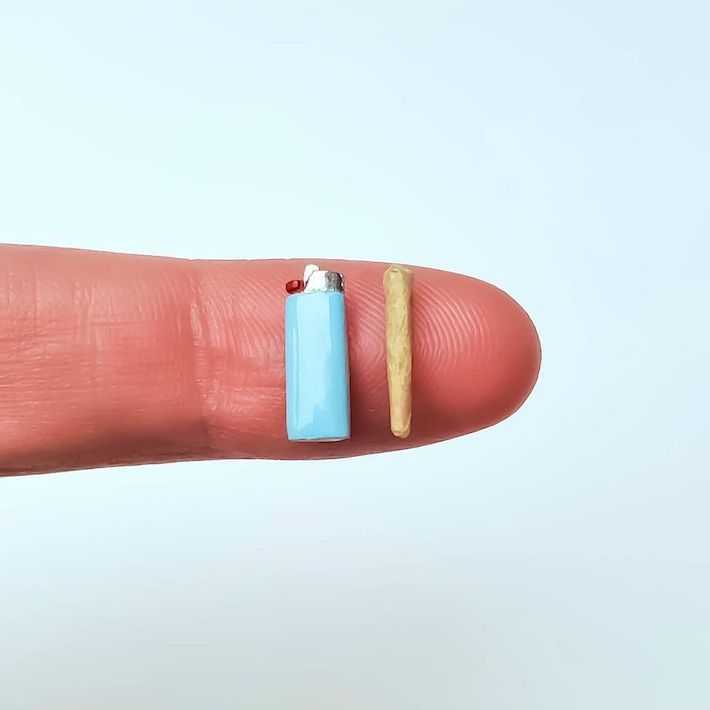
Microdosing cannabis basically follows the same principle as microdosing LSD or other hallucinogens. You take a small amount of the substance you’re looking for – just enough for it to have some effect but not enough to produce the full effect of the drug.
For cannabis, microdosing is usually discussed in the context of medical use, because most people who need THC for medical purposes don’t really want to get high (or at least not very high) in the course of taking their medication. But with evidence that lower dosages are often effective when it comes to the medical benefits of cannabis, many people are opting for lower doses for their medical use.
For recreational use, there is less interest in microdosing, but the advent of cannabis-infused drinks has led to more people consuming what might be considered a microdose without a medical reason. This very much depends on your definition and the specific weed drink you’re consuming, with a microdose generally considered to be anything under 10 mg, and many cannabis-infused drinks having 10 mg per serving. However, several cannabis drinks contain less than 10 mg (even as low as 2 mg) and so definitely offer a micro-dose.
Are cannabis drinks healthier than alcohol?
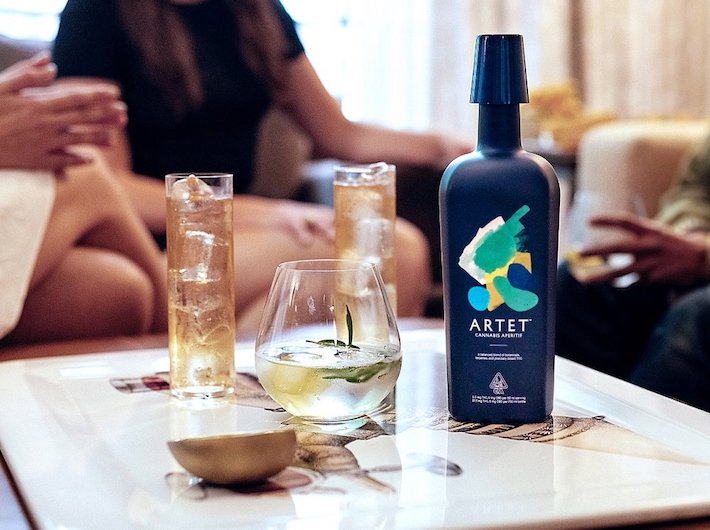
Cannabis drinks are almost certainly safer than alcohol. Cannabis is generally safer than alcohol, even if you vape it and likely even if you smoke it (unless you smoke a lot). Essentially, alcohol poisons you, giving your liver a lot of things to process and having multiple potentially serious effects as your blood alcohol level gets higher.
Of course, it’s possible to drink enough alcohol to literally die, whereas the lethal dose of cannabis is so high that it would be unfeasible to actually reach it. A large proportion of the risks of cannabis come down to the dangers inherent in smoking, and while there is some risk for mental health issues this is generally not likely, especially if you’re an adult without a predisposition to such illnesses.
Related: Is it safe to mix cannabis and alcohol?
So with this all in mind, it’s kind of unavoidable that cannabis drinks are safer than alcohol. For how “healthy” they are in a more nutritional sense, most cannabis-infused beverages explicitly focus on being low calorie, low sugar and low (or zero) carbs.
For example, HiFi Hops has zero carbs and zero calories, made by beer brewer Lagunitas with a focus on hops but without the alcohol. In comparison, most alcoholic drinks – other than something like vodka and tonic – come with a pretty substantial amount of calories and usually tons of sugar to boot. If you’re looking to enjoy a night on the town without jeopardizing your diet, cannabis-infused drinks are a great way to go.
Are they socially a more responsible product?
The degree of social responsibility of weed beverages vs. alcohol is debatable, but there’s a clear case that they’re likely to be more socially responsible.
The classic point people often make about cannabis vs. alcohol is that people who are high are very unlikely to get into fights, be loud and aggressive, vomit or a lot of typically socially irresponsible drunken behavior.
In terms of your impacts on other people, it’s pretty unlikely that anyone consuming a cannabis product is going to be as bad as somebody who’s drunk.
Who would benefit the most from cannabis infused drinks?
The biggest benefit of infused drinks is allowing somebody to consume THC and/or CBD in reasonable quantities without having to smoke or vape. So the people who would benefit most from the drinks are people who either want to use cannabis but are against smoking, vaping and possibly even edibles, or people who’ve wanted to try cannabis in a relatively mild form without smoking or vaping it.
Another example is people who have health issues which make smoking unwise but who still want to use, and many initial customers of infused beverages have been older people for this reason.
They could also potentially help two other groups of people in particular.
Firstly, if you’re a recovering alcoholic – or just someone who drinks a little too much sometimes – who wants a “bar-like” experience while not falling off the wagon, switching to a low-dose cannabis drink might be a good middle-ground, where you don’t have to stay completely sober but where you also don’t end up getting wasted again.
Secondly, if you have a medical need for marijuana but edibles generally contain higher doses than you need, they could be a great option.
What types of cannabis-infused drinks are there?
Even though the variety of cannabis-infused drinks is limited by the fact that they’re generally not legally allowed in combination with alcohol, there are still quite a lot of options if you’re looking for an infused beverage.
- Beer: Although most of the options like this aren’t exactly beer – for example, Hi-Fi Hops calls itself “hop water” – they are basically a healthier version of beer. You still get the hops, but with the cannabis extract alongside it, bringing some weed-y flavor into the non-alcoholic drink.
- Tonics: Tonics, spritzers, seltzers and similar carbonated drinks made by brands like Rebel Coast are the most common type of cannabis-infused beverage on the market today. They’re a pretty good solution because they can have a wide range of flavors, they’re pretty healthy as standard, they’re light and generally refreshing.
- Wine: Along with (sort of) beer, you can also get cannabis-infused wine, basically grape-based drinks with cannabis in place of the alcohol. The most talked-about version of this is the House of Saka Pink, a light rosé made from pinot noir grapes and with a THC-heavy mix but a little bit of CBD in there too.
- Cocktails: Kind of an expansion of the tonic/seltzer idea, there are also many options that are essentially non-alcoholic cocktails with some THC and CBD in the mix. Again, the flavors can be varied easily and it gives the whole thing a classic “drinking” like feel.
- Sodas: You can also pick up lemonades, colas and similar drinks with cannabis. For example, Keef Cola offers root beer, orange cream soda and grape among their flavors. Creative Waters makes sparkling waters and craft beverages infused with CBD and THC.
- Tea and Coffee: Although these are less common, some companies have cannabis-infused teas and coffees available too. For example, Catapult Coffee Pods are designed to fit in Keurig coffee machines, and each has 10 mg of THC. For teas, you can find iced tea from companies like Good Stuff Tonics, which offers a raspberry iced tea with 100 mg of THC with 125 mg of caffeine too.
RELATED: 6 Best THC-Infused Drinks to Try Now
What are the legal and marketing restrictions around infused drinks?
States with legalized recreational marijuana are the only places where you can buy cannabis infused beverages, but with the legal situation still being pretty contradictory, the regulations surrounding them are still a little unclear.
Generally speaking, you can’t mix cannabinoids with alcohol in a product, as Michigan-based bars and restaurants found out in 2019, but if your drink is just cannabinoids, then it’s allowed. Some states – again, Michigan is an example – only allow these drinks to be sold at places where alcohol isn’t allowed, but this isn’t always the case. Additionally, the age limit for products is the same as the legal age for cannabis products in the state-level law.
For marketing, the restrictions basically follow the same pattern as the general rules for advertising of cannabis products, which vary by state. However, these generally include provisions to ensure the advertisements neither reach nor portray young people. For example, in Colorado, advertisements on television, radio, print media and the internet are only allowed when no more than 30% of the audience is likely to be under the age of 21 (as determined by the Retail Marijuana Establishment).
The situation with hemp products should be simpler, given that the Farm Bill legalized hemp, but even in that case there are complexities. For example, you can’t use the word “hemp” freely, but you are allowed to say something like “brewed with hemp seeds.” In practice, this is about as confusing as it sounds, and it seems things are generally taken on a case-by-case basis.
What is the FDA’s stance on labeling for infused beverages?
Because of the confusing situation at federal level, the most crucial factor when it comes to labeling is the rules enforced by your state, so manufacturers need to check with the local authority (either the public health or cannabis regulatory authority) to ensure the product will be compliant.
For example, in California, you can’t use clear bottles for cannabis-infused beverages, but in other states this isn’t an issue. More generally, like most food and beverage products, they must contain nutritional facts, ingredients listings, list any allergens, add a Prop 65 warning if applicable and other similar components.
For cannabis products specifically, they should include the names of the active ingredients, the dosage per serving and the total dosage in the product (these are best in the principal display panel on the front of the product), as well as the active ingredients included on the main ingredients list as well. It’s also recommended that they aren’t labeled as dietary supplements.
Do any alcohol companies invest in THC drinks?

Some alcohol companies have gotten involved with cannabis-infused drinks. In particular, Lagunitas – a company owned by Heineken and famous for its IPA – are partially responsible for Hi-Fi Hops, the beer-ish hop drink infused with cannabinoids. Additionally, Pabst (known for the classic PBR) have added a THC-infused drink to their line-up, Constellation Brands (owners of Corona and Modelo) have invested with Canopy Growth, the biggest weed producer in Canada and Molson Coors have joined up with another Canadian producer called HEXO.
The industry’s interest is basically driven by the increasing interest in cannabis-infused beverages, and understandably if people start to move away from social drinking, they want to get in on the ground floor.
What could the future look like?
With cannabis beverages becoming more popular – assumedly due to millennials drinking less alcohol – it’s likely that more alcohol companies will get involved with the cannabis drink industry, essentially shifting their offerings to fall more in line with customer preferences.
In short, they don’t want to lose their business to the new big thing, and they have deep enough pockets to take a little risk on the budding industry. While you might have expected some backlash from the industry (and maybe it will come), at the moment it’s looking more likely the industry will lobby to reduce the tax on cannabis beverages. For example, Pabst Labs is a member of the Cannabis Beverage Association, which is actively lobbying for tax relief to allow the industry to flourish.
Although it’s not exactly clear how much interest there is in cannabis beverages, the biggest potential issue for the industry is the law. Legal states are still in something of a limbo, and it’s likely that at some point federal law will come up to speed and the FDA will have to step in with some regulations or other guidance for the industry. This could lead to extra restrictions, and possibly make it more difficult to continue in business. However, as things stand this appears to be quite some way off, and it’s entirely possible (if not probable) that any changes at the federal level would be positive for the industry.
RELATED: Do CBD Drinks Actually Help You Relax?
Conclusion
Cannabis-infused beverages are an interesting concept, with the potential to introduce more people to cannabis in a low-dose, socially acceptable format. It might not be something for everyone, and established consumers might have nothing more than a passing curiosity about the idea, but it has more potential to become an accepted part of socializing than smoking, vaping or even edibles. Will it take over the role of alcohol? Probably not. But there’s a good chance it will give you more options for the type of night on the town you want to have.
Editor’s note: This article was originally published on April 16, 2021 and recently updated on October 10, 2022.
